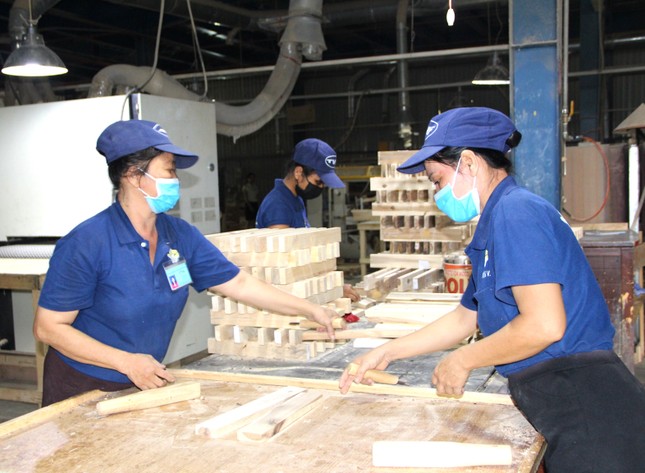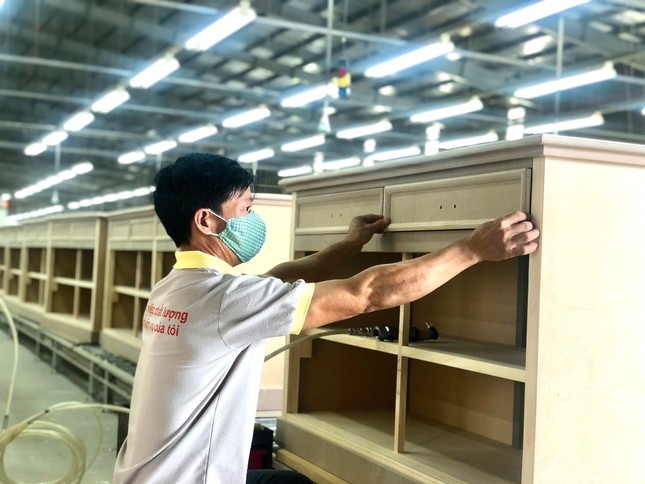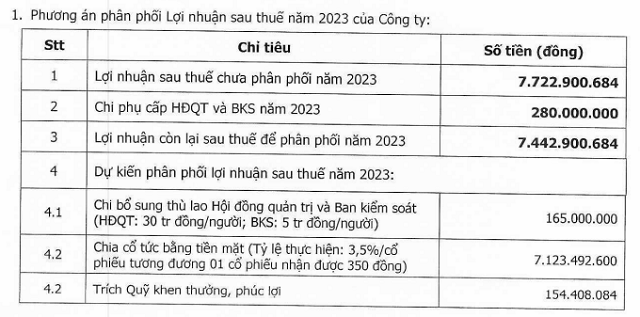The Way of Fake “ Made in Viet Nam ” Products
Sharing with reporters, the director of a wooden company (requesting anonymity) with a factory located in Tan Uyen city (Binh Duong) said that wood is a key export industry in Binh Duong in particular and Vietnam in general, highly appreciated by the world market. However, in recent years, due to the impact of global geopolitics, the COVID-19 pandemic, and the situation of “counterfeit goods”, many wooden enterprises are struggling.

Production activities at Lam Viet Wood Company’s factory (Binh Duong).
This businessman revealed that he was once asked by several foreign wood companies to cooperate in setting up a company to assemble products pre-produced from abroad and then brand the products with Vietnamese trademarks. He shared: “They offered very high profit margins, but because I recognized the harmfulness of cooperating to forge the origin of the goods, I did not agree. Later, they also found other companies to cooperate in the way that I had refused”.
Confirming that the above phenomenon is real, Mr. Pham Van Xo – Chairman of Binh Duong Import-Export Association said that he is the owner of a company and has been approached by many foreign companies with invitations for cooperation. Mr. Xo flatly refused when he heard about the fact that goods produced abroad were labeled with the origin “Made in Viet Nam”.
“The situation of goods originating from abroad being transferred through Vietnam to legalize documents or apply for a certificate of origin, before being exported to a third country is very worrying. The act of forging the origin of goods has seriously affected many domestic production sectors” – said the Chairman of Binh Duong Import-Export Association.
Mr. Nguyen Liem – Chairman of the Board of Directors, Director of Lam Viet Wood Joint Stock Company and Chairman of Binh Duong Wood Processing Association (BIFA) said that counterfeit wood products of Vietnamese origin aim to take advantage of tax benefits when exporting to other countries, not only causing economic damage but also negatively affecting the reputation of the domestic wood industry.
The Chairman of BIFA gave an example: “Many wooden products do not state the origin of the goods, but by various methods and tricks, foreign entities bring them to Binh Duong to trade, consume, and establish companies with different types of goods, equipment, and components, then assemble them into finished products and brand them “Made in Viet Nam”.
According to Mr. Liem, some of Vietnam’s exported wooden products are currently facing the risk of evading anti-dumping and anti-subsidy taxes in the US market. The risk arises when these items or parts of the items are imported, assembled in Vietnam, labeled as originating from Vietnam while not meeting the conditions to be granted a certificate of origin as prescribed, but are then exported to the US. Many wooden enterprises in Binh Duong have been affected by this issue.

At Mekong Furniture Company (Binh Duong).
Explaining why foreign companies seek to approach enterprises in Vietnam, the Chairman of BIFA said that Vietnam has joined many free trade agreements. From that, some companies producing goods abroad, by various means, seek to bring goods into Vietnam, forge Vietnamese origin for export, and enjoy tax incentives for member countries of the agreements that their countries do not have.
“Tightening the input and controlling the output”
From the difficulties and disadvantages that enterprises have encountered in recent times, the Chairman of Binh Duong Import-Export Association has recommended that functional agencies study trade defense measures. Specifically, currently, countries restrict trade fraud by requiring proof of the supply chain. Exporters must demonstrate that they are part of the supply chain for the product. Otherwise, it is certain that the company is forging its origin.
“Vietnam needs to do this in order to avoid foreign invested companies from interfering with products and borrowing Vietnamese origin. To do this, it is necessary to control both the output and the input, including domestic enterprises” – proposed Mr. Nguyen Liem, Chairman of BIFA.
Nguyen Thanh Binh, Deputy Director of Binh Duong Customs Department, said that with more than 85% of enterprises operating in processing, manufacturing, and exporting enjoying tax exemption policies, this locality always has the potential risk of trade fraud. “Binh Duong Customs has synchronously implemented professional measures to control, proactively review policy inconsistencies, and make proposals and recommendations to competent authorities to amend, supplement, or issue new legal documents, combat fraud, forge origin, and illegally transfer goods. On the other hand, the province focuses on self-training and improving the capacity of customs control forces to ensure effective implementation of anti-smuggling and trade fraud in the area”, said Mr. Binh.
According to lawyer Nguyen Thi Lan Anh, HTC Vietnam Law Company Limited, individuals who only aim to exploit the commercial reputation of the owners of industrial property objects to increase business profits, not to deceive consumers about the quality of products, will be handled for the Crime of infringement of industrial property rights. In addition to fines, the crime of infringement of industrial property rights is punishable by up to 3 years in prison.








































